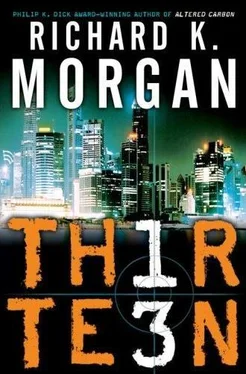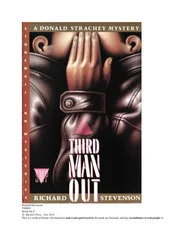Richard Morgan - Black Man / Thirteen
Здесь есть возможность читать онлайн «Richard Morgan - Black Man / Thirteen» весь текст электронной книги совершенно бесплатно (целиком полную версию без сокращений). В некоторых случаях можно слушать аудио, скачать через торрент в формате fb2 и присутствует краткое содержание. Город: NY, Год выпуска: 2007, ISBN: 2007, Издательство: Del Rey, Жанр: Боевая фантастика, на английском языке. Описание произведения, (предисловие) а так же отзывы посетителей доступны на портале библиотеки ЛибКат.
- Название:Black Man / Thirteen
- Автор:
- Издательство:Del Rey
- Жанр:
- Год:2007
- Город:NY
- ISBN:0-345-48525-4
- Рейтинг книги:4 / 5. Голосов: 1
-
Избранное:Добавить в избранное
- Отзывы:
-
Ваша оценка:
Black Man / Thirteen: краткое содержание, описание и аннотация
Предлагаем к чтению аннотацию, описание, краткое содержание или предисловие (зависит от того, что написал сам автор книги «Black Man / Thirteen»). Если вы не нашли необходимую информацию о книге — напишите в комментариях, мы постараемся отыскать её.
Carl Marsalis is a traitor, a bringer of death, a genetic freak and an unwelcome reminder of all that is dark in the human psyche — he in every sense of the word a Black Man. And right at the moment he’s beyond the UN’s juristiction, banged up in a Florida jail for financing an illegal abortion. So when the US police call, Carl cuts a deal.
The 13s are genetically engineered alpha males, designed to fight the century’s last conflicts. But men bred and designed to fight are dangerous to have aroundin peacetime. Many of them have left for Mars, but one has returned. Somehow he survived the journey to Earth, and now a series of brutal slayings has erupted across America. Only Carl can stop him.
And so begins a frenetic man hunt and a battle for survival. And a search for the truth about what was really done with the world’s last soldiers.
Author’s Notes:
“An accidentally lengthy meditation on elements of the human condition that the Kovacs books always had the capacity to sidestep — namely, the prison of our own flesh, and the inevitable doom of our own mortality. A future of genetic science out of control, geo-politics out of joint, and fresh colonial and racist aspirations for the whole human race.
“It took me two years to pull all this material together (or, some might say, apart) — check it out, see if it’s been worth it.”
From the Hardcover edition:
The future isn’t what it used to be since Richard K. Morgan arrived on the scene. He unleashed Takeshi Kovacs—private eye, soldier of fortune, and all-purpose antihero—into the body-swapping, hard-boiled, urban jungle of tomorrow in
,
, and
, winning the Philip K. Dick Award in the process. In
, he launched corporate gladiator Chris Faulkner into the brave new business of war-for-profit. Now, in
, Morgan radically reshapes and recharges science fiction yet again, with a new and unforgettable hero in Carl Marsalis: hybrid, hired gun, and a man without a country…or a planet.
Marsalis is one of a new breed. Literally. Genetically engineered by the U.S. government to embody the naked aggression and primal survival skills that centuries of civilization have erased from humankind, Thirteens were intended to be the ultimate military fighting force. The project was scuttled, however, when a fearful public branded the supersoldiers dangerous mutants, dooming the Thirteens to forced exile on Earth’s distant, desolate Mars colony. But Marsalis found a way to slip back—and into a lucrative living as a bounty hunter and hit man before a police sting landed him in prison—a fate worse than Mars, and much more dangerous.
Luckily, his “enhanced” life also seems to be a charmed one. A new chance at freedom beckons, courtesy of the government. All Marsalis has to do is use his superior skills to bring in another fugitive. But this one is no common criminal. He’s another Thirteen—one who’s already shanghaied a space shuttle, butchered its crew, and left a trail of bodies in his wake on a bloody cross-country spree. And like his pursuer, he was bred to fight to the death. Still, there’s no question Marsalis will take the job. Though it will draw him deep into violence, treachery, corruption, and painful confrontation with himself, anything is better than remaining a prisoner. The real question is: can he remain sane—and alive—long enough to succeed?












